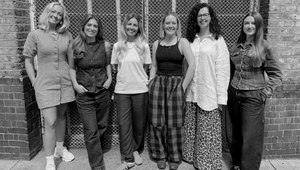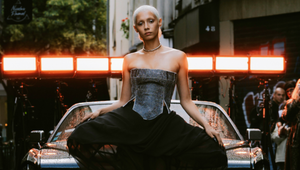
5 Minutes with… Alex Wilson

Amplify’s executive creative director Alex Wilson has been a creative director, worked in production and within account management, all of which make him a ‘multi-hyphenate’ in the industry today. His work for PlayStation, Netflix and Amazon have influenced culture and created conversations that are facilitated by fans.
Beginning his career in New York at Protozoa Films, Alex has worked at agencies including Jack Morton, Sunshine and Wild Things, where clients included Grey Goose, Yorkshire Tea and Stay One Degree. Joining Amplify in 2019, he’s helped realise the vision of ‘creating experiences that could live just as impactfully on screen as they could in real life.’
Alex spoke to LBB’s Nisna Mahtani about campaigns that capture the audience and create escapism at a challenging time.
LBB> What was your upbringing like and what sort of kid were you?
Alex> One word to describe my upbringing would be, supportive. I was a kid that was interested in a lot of things, sports, movies, arts, gaming, books, etc, but no matter what, my parents supported, encouraged and enabled me to take part in and follow those passions. I was incredibly fortunate in that regard.
As an only child, I tended to pursue a lot of interests that only required me and my imagination. I spent a lot of time watching movies, and my bedroom floor would often become a film set starring my toys, shot on my Dad’s camcorder. I loved drawing and writing stories, but at no point did I really see or even know that I could be a ‘creative’ when I grew up. Up until I was about 18 I only had intentions of becoming an Olympic sprinter, something that I obviously did not pursue and to be honest, the fact that Usain Bolt is in my age group shows I made the right choice.
LBB> You began your career working in movies with the likes of Darren Aronofsky! How did you land that gig and what was that period in your life like?
Alex> I started off post university, interning at various London film distribution companies and spent some time at the London Film Academy where I wrote, produced and directed short films. I then sort of fell into event production and some creative consultation through word-of-mouth recommendations, before acknowledging that the film path was still a route I wanted to explore.
I knew that New York was where I wanted to go and I know a few people there from school and university. I asked a friend if I could crash on his couch for a week and I went about writing to every NYC based production company and film school, milking every connection I could to see if I could get some meetings in place. I was able to get one meeting, which was with executive producer Scott Franklin at Protozoa Films (Aronofsky’s production company).
We had a coffee at their offices in Brooklyn where he ripped up my printed CV on the spot, refusing to even look at it and after a five minute conversation, he offered me an internship. After three months I became his assistant and we went into pre-production on Black Swan.
It was an unbelievable experience and everyone on set was incredibly generous with their time and knowledge. I got to sit through everything from rehearsals, casting, location scouts, to being on set every day of the shoot and experience post production. It’s a time I will never forget. Nor stop going on about to anyone who listens.
What I took most from it was witnessing Darren’s on set creative problem solving, something I believe I have taken with me through my own career.
LBB> How did that then lead to an interest in experiential marketing?
Alex> My experience working on Black Swan taught me most that I loved movies too much to work on them. It may seem odd, but it lost a certain magic for me once I peeked behind the curtain and I didn’t want to lose being an audience member, who could look up at the silver screen to experience and marvel at the art of filmmaking.
But I also saw that there was an opportunity for me to combine my cinematic sensibilities and passion for storytelling with some of the experience I’d had in creative and experiential, prior to going to NYC.
Whether you are creating something to live on screen or live in the room, both need an audience, both need a narrative and both need to induce emotion.
LBB> In your career you've done production, account management and been a creative director. How do those all overlap, feed into each other and how does it shape the way you approach projects?
Alex> Ten years ago I was often accused of lacking a specialism or direction. Now I’m considered a multi-hyphenate. A large part of that is that the industry has shifted to embrace more hybrid skills, but I also had to find my way to best translate that experience both into output, but also format.
Being able to ideate in ways that are channel agnostic has been one key consequence and the other is knowing what it takes to bring ideas to life. Cross team and cross agency collaboration is so key, especially with the speed we are expected to deliver work these days, so it helps to have a holistic understanding of what is is required to take an idea from inception to delivery.
LBB> What's the project that you've learnt the most from in your career?
Alex> My first ever event job as a production assistant on the Hampton Court Palace Festival in the early 2000s was certainly a sink or swim opportunity that taught me a lot, but interestingly less about production and more about working with people.
But if pushed, I would probably say the web series Grey Goose: OFF SCRIPT in 2018, which had Jamie Foxx have one-on-one conversations about movies with other A-List talent. Less so learnings in terms of the project itself, and more in terms of discovering what direction I wanted to go and what sort of work I wanted to create.
I’d never made a TV or web-based show in LA to that point so there were incredible learnings there of course. Seeing brands allowing themselves to move into the entertainment and publisher space showed me the potential of how we could bring brands to life. Moving forward, something we are starting to see a lot in the work we do at Amplify, most recently with PlayStation, Bite Back and Netflix.
LBB> What first attracted you to Amplify in 2019 and why do you find it exciting now?
Alex> When Amplify’s founder, Jonathan Emmins and CCO, Jeavon Smith first approached me about founding the Content Department in 2019, there was very little internal debate in my mind.
They had just made Airbnb A Night…At the Louvre, had just secured the culture platform campaign with Dr Martens and were talking the same language I was in terms of creating experiences that could live just as impactfully on screen as they could IRL. It felt like a ‘stars align’ moment.
It’s fair to say a lot has happened the last two years, and one result of that is the supercharging of the plans we had as an agency, in regards to both the content team and the shape of the work. With the merge of the creative and content department and a host of new channel agnostic creative recruits, I can confidently say I’ve never been more excited by the direction the work is going, and in particular the young talent we are bringing in to create it.
LBB> You've worked on a series of brilliant experiential anamorphic billboards recently. Can you talk us through your favourites and what the challenges were to make them?
Alex> PlayStation, Fortnite and Amazon Wheel of Time all did something different which is what is so exciting about the format.
With the launch of the PS5 we were able to redefine what a product launch can be. How do you launch a cultural icon in lockdown when there is no IRL audience to launch it to? Turning the world ‘PlayStation blue’ in over 25 territories as midnight hit in different time zones was an incredible achievement.
Amazon’s Wheel of Time was a really exciting challenge as we weren’t working with product, but with IP. Bringing the themes and iconography of the show to life in a 30 to 60 second show window allowed us to really dig into the show’s target audiences. Amazon Studios and Rosamund Pike were also incredibly collaborative in helping us capture her in-camera from multiple angles, to get what we needed to break new ground within the format.
Fortnite was the antithesis of what we did for Amazon. Where Wheel of Time was excitement, action and motion, for Fortnite we flipped it on its head and created ambient content, packed with Easter Eggs for the game’s fanatical community to dig into and drive conversation.
LBB> More broadly speaking, how do those projects fit into your thoughts on how traditional formats should evolve?
Alex> What we’ve seen in the last couple of years is that thinking should not be restricted by format. Our studio is full of talent that ranges from architects, sculptors, filmmakers, photographers, innovation specialists, musicians, the list goes on. When you have people that play in those worlds, and you give them the freedom to approach briefs and challenges untethered, that’s when truly special work comes to life.
Inspired by my creator-crush Donald Glover, I talk a lot about world building. The more we embrace evolved and new formats, continue to expand and explore the worlds of brands and IP, the more compelling the work becomes. It’s not shoehorning in formats to keep pace with a new trend (see metaverse and NFTs), it’s being brave enough to know that there are many ways to tell a story and engage an audience, which is what should be at the heart of every creative response.
LBB> A lot of those campaigns key into big pop cultural moments. What are your thoughts on working in that space today?
Alex> PlayStation only launch one console a decade so they are a huge moment in gaming culture and beyond. As something that breaks through the echo chamber of gaming, it’s an exciting space to play in which is one of the reasons the scale and method of the launch resonated so much.
Fortnite is similar in that a huge audience of people who don’t play it are still aware of it as both a gaming, creator and media space, but the launch of a new chapter allowed us to go a level deeper into the passion of its hardcore fan base, whilst still creating broader awareness.
Our industry talks a lot about affecting culture, which in reality is rare to actually achieve, but as long as you are creating and supporting things audiences love, rather than hijacking them, you are playing in the right space.
LBB> What's been inspiring you lately in culture?
Alex> Film director duo the Russo Brothers talk about painting themselves into corners when scriptwriting. This means that the only way to get out of that corner is through creative problem solving and lateral thinking. Every creative in every discipline and medium the last couple of years have been painted into their own corners, and not by their own doing.
I’ve been inspired by creators’ abilities to navigate and reinvent communication and experience throughout this time and how it continues to reshape both multiple industries and culture itself.
I’ve written previously about the importance of us causing joy through entertainment, escapism and experiences during this complex and challenging time, and that is something the creative community has continued to output relentlessly the last few years. Which has both inspired me, but also kept me and those I love sane.















